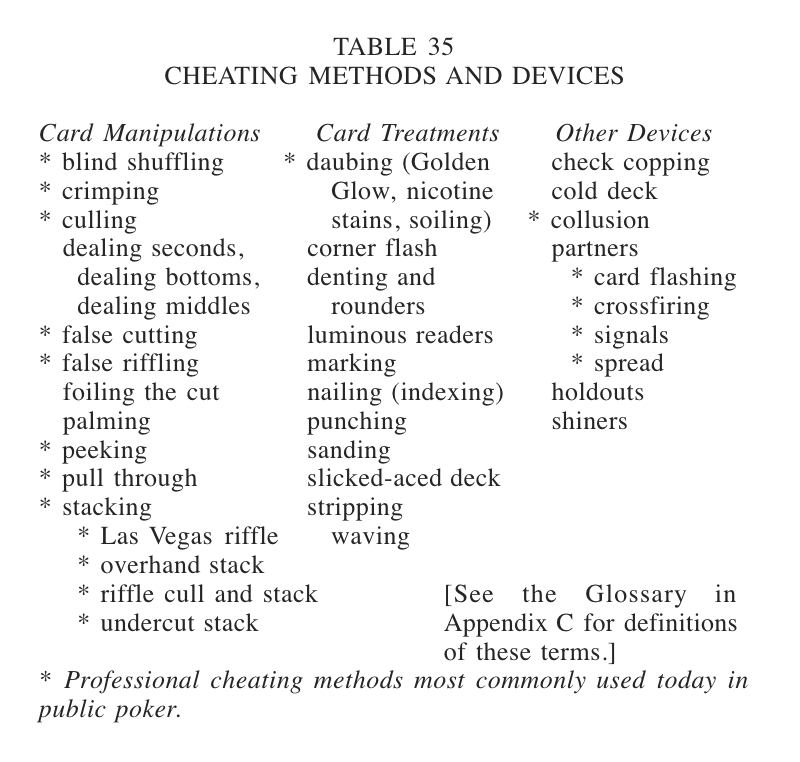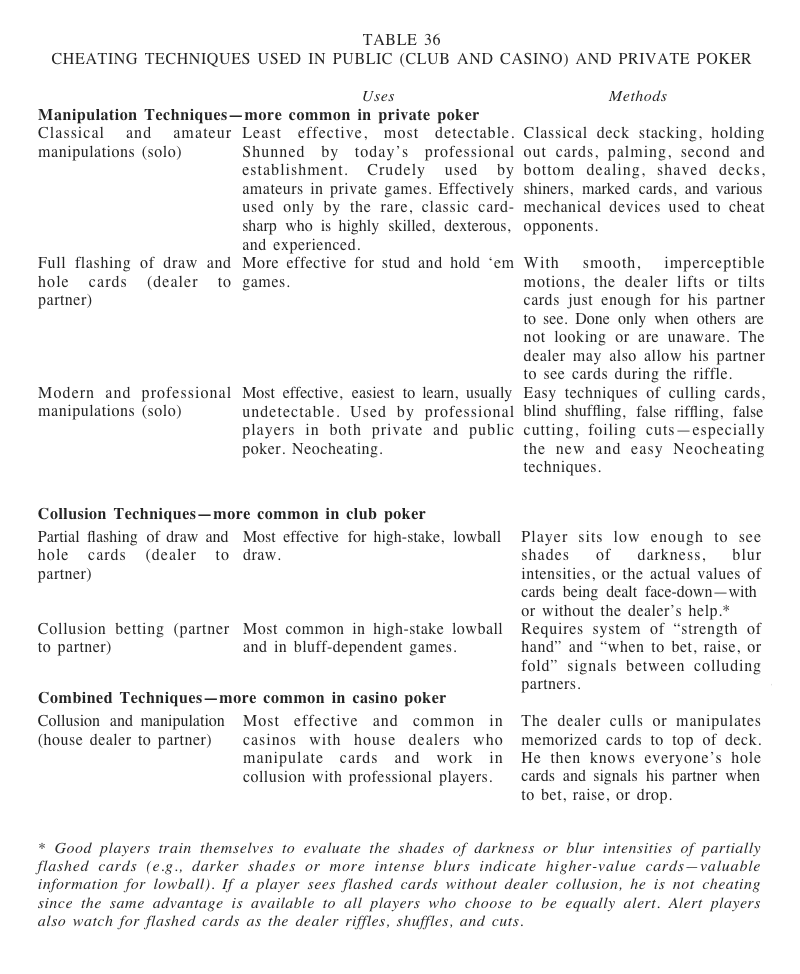Professional Cheating
Perhaps the most profound difference between private poker and public poker (club or casino) is the collusion cheating practiced by many professional players in public poker. Few outsiders or victims detect or even suspect professional cheating in public poker because such cheating is visually undetectable. Public-game professionals execute their collusion so naturally and casually that upper management of major casinos and card clubs generally remain unaware of their cheating, even when it routinely occurs in their casinos and clubs. Many public-game professionals accept and practice collusion cheating without qualms. They consider their cheating a natural and legitimate trade tool that enables them to offset the draining effect of the house rake or collection.
The most important classical and modern professional cheating methods and devices are listed in Table 35.

To win consistently at high-stake casino or club poker, the good player has two choices: (1) join the professional establishment and become part of their collusion-cheating system,33 or (2) develop and use techniques to profit from the cheating of others. But in certain games such as high-stake lowball, collusion cheating by professionals can prevent even a good player from winning. As identified in Chapter XXXI, professional collusion cheating in lowball poker can diminish the good player’s investment odds so greatly that he cannot win, even with his superior alertness, poker skills, and strategy.
Table 36 summarizes some of the important cheating techniques that professional poker players use in public clubs and casinos. That table also includes the classical but crude cheating techniques occasionally used by amateurs.34 Contrary to popular belief, almost any player can master effective, invisible cheating methods with only a few hours of practice. A book, Neocheating — The Unbeatable Weapon in Poker, Blackjack, Bridge and Gin, by Frank R. Wallace, Mark Hamilton, and William S., identifies and describes in detail those new and easy cheating techniques that professional players are using today in poker clubs and casinos.
_______________________
33Most public-game professionals admire and respect the good poker player and readily accept him into their establishment (especially in Gardena and Las Vegas). Their ready acceptance of the good player seems contradictory to their best interests since such acceptance increases competition for the losers’ money. But those professionals both respect and fear the independent good player. He is a threat to their system. They eliminate that threat by making him a part of their system. By contrast, the private or non establishment good player tries to get rid of any competing player who is good enough to drain money from the game.
34Classical cheating (e.g., stacking specific hands, second dealing, holding out cards) seldom occurs in club or casino poker. Occasionally amateurs, strangers, or newcomers attempt classical cheating in public poker. But since their techniques are almost always crude, they are

In club poker, the alert player detects professional cheating most often in the highest-stake lowball games in which signaling systems and card-flashing collusion are devastatingly effective. In casino poker, the alert player detects collusion cheating most often in the highest-stake stud and hold ‘em games.
Not all public-game professionals are cheaters or part of the professional establishment.35 Not all high stake public games have cheaters, or even professionals, present. But any high-stake public game free of cheaters and professionals is ripe for exploitation and quickly attracts professionals and cheaters. Still, out of justice and fairness, the good player never considers anyone to be a cheater until he has adequate proof of cheating. Moreover, the good player strives to be just and fair in order to know more accurately what is going on and thus avoid costly errors. Being just and fair boosts his profits.
_______________________
35 Likewise, not all private-game professionals are independent loners or above cheating.
The good player resists the temptation to blame tough or painful losses on being cheated (rather than on coincidence or on his own errors). Because of the extra quick folds and the extra-aggressive bets used to beat cheaters, the good player can make an expensive error by misreading an opponent as a cheater.
Since cheating harms the long-range business interests of all public card clubs and casinos, management of the major clubs and casinos seriously oppose any form of cheating. They have always taken firm measures to eliminate and prevent cheating in their operations. For them, cheating means only bad publicity, lost business, lower profits, and potential legal problems. Without cheating, clubs and casinos can eventually extract all the money gamblers have to offer. With cheating, clubs and casinos could eventually go out of business.
Using tight controls and effective surveillance systems, the management of major casinos keeps all gaming operations (except poker) free of major, organized, or chronic cheating. All casino games, except poker, function between casino and player, allowing management to closely monitor and tightly control the action. But in poker, the game functions between player and player (not between casino and player), leaving the management unable to monitor and control the action. That uniquely uncontrollable situation combined with the undetectability of professional collusion cheating makes poker the only casino game in which management has no practical way to detect or eliminate such cheating. Also, casino management and its employees are less motivated to ferret out poker cheating because in poker, the players (not the casino) lose money to cheaters. But in other games, the casino (not the players) loses money to cheaters.
The public view of casino cheating differs markedly from the actual situation. Several years ago, for example, a major poker cheating conspiracy was publicly exposed in the Las Vegas MGM Grand Hotel and Casino, the world’s largest gambling establishment. The police arrested the cardroom manager, the floorman, two dealers, and five outside partners—all were charged with illegal conspiracy and felony swindling. That publicized incident coincides with the public view of professional cheating in casino poker. But the authorities caught those alleged “professional cheaters” only because they were amateurish and crude in their techniques of culling, stacking, and peeking. Allegedly, they even resorted to copping chips from pots. But the MGM cheating scandal did not involve or even touch on the real professional cheating that flourishes with casual finesse in higher-stake poker games, unchecked by casino management and unnoticed by the public.
Even if professional cheaters were eliminated from a high-stake game, a wave of new professionals and cheaters would fill the vacuum in order to exploit the “easy pickings” inherent in any new or clean public poker game. The financial incentive is too great to prevent professionals and cheaters from quickly moving into high-stake poker games filled with tourists, losers, and other easy amateurs.
What will happen when management and the public become increasingly aware of this uncontrollable professional cheating? Most casinos could simply drop poker from their operations (or at least eliminate cheater-prone high-stake poker) with little lasting effect on their profits. But how will commercial poker clubs handle undetectable professional cheating? Nearly their entire business depends on poker, which, in turn, depends on the trust and confidence of their most important customers—the losers. Unless management can stop the spread of professional cheating (especially Neocheating), the commercial poker clubs could encounter business difficulties if the majority of their customers (the losers) began discovering and understanding the extent of professional cheating in their games.36
Since many professional poker players depend on collusion for a living and since their cheating is generally undetectable, management currently has no practical way to eliminate their cheating. One long-range solution might be tamper-proof mechanical or electronic shuffling and dealing devices that would not only eliminate undetectable dealer-player collusion, card flashing, and most card manipulations, but could also reduce operating costs by eliminating dealers, accelerating the action, and automating house collections. In turn, lower operating costs could result in lower-percentage house cuts. Also, elimination of competition from professional cheaters would further increase the profits of good players and independent professionals who win through their own skills rather than through cheating.
_______________________
36Chronic or heavy losers might even sue those card clubs and casinos in which they had systematically lost money to professional cheaters. But those losers would probably need corroboration from several professional cheaters to support any serious litigation.